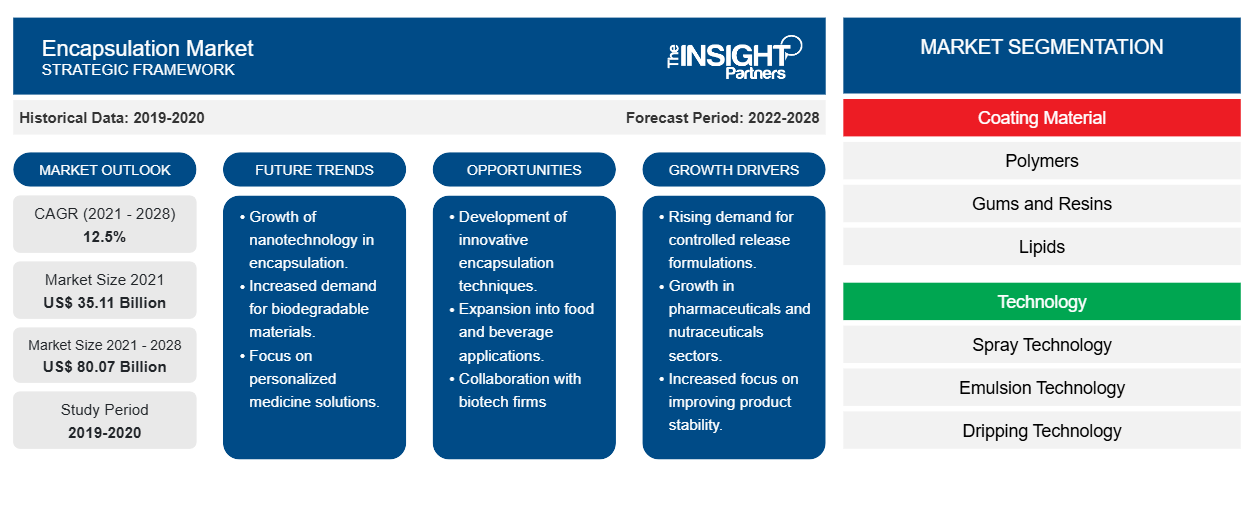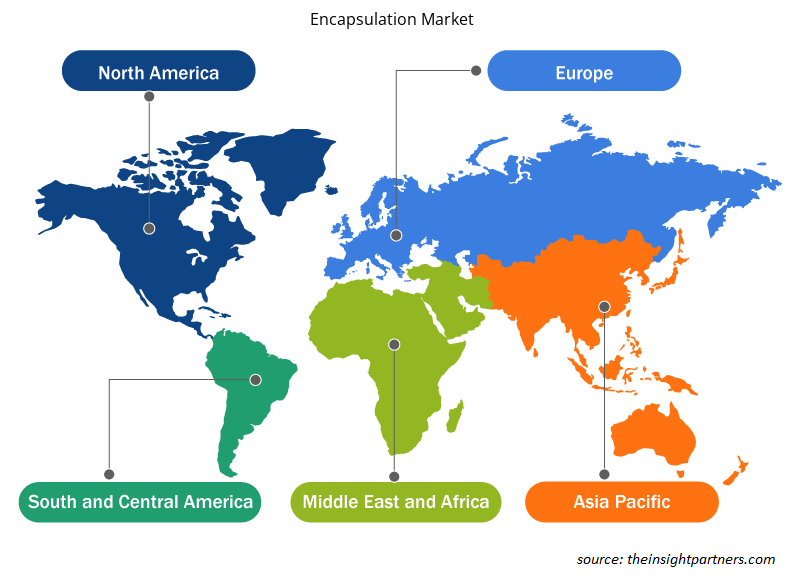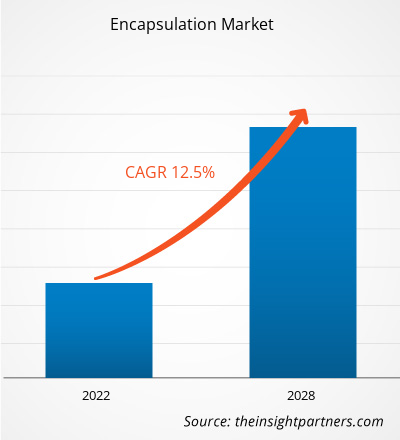The encapsulation market is expected to grow from US$ 35,113.49 million in 2021 to US$ 80,071.65 million by 2028; it is estimated to grow at a CAGR of 12.5% from 2021 to 2028.
The demand for encapsulation is significantly increasing owing to the growing demand for encapsulated flavors and colors from the convenience food sector. The changing fast-paced lifecycle of individuals across the world along with the growing urban population worldwide drives the need for convenience food products. The demand for encapsulated pharmaceuticals is rising due to the increasing burden of diseases, improving healthcare systems, and rising disposable incomes, which is also boosting the market growth.
The encapsulation market in Asia Pacific is expected to grow at the highest CAGR during the forecast period. Many Asia-Pacific countries, such as China and India, are among the world's fastest-growing populations. The food industry is expanding in the region because of its wide range of applications. The existence of various established sectors, such as food & beverages, in China, India, Japan, and South Korea has increased the demand for packaging solutions in the region. The high demand for dietary supplements among the youngster population is driving the encapsulation market. Major constituents of dietary supplements, such as vitamins and enzymes, require targeted delivery. A few trendy factors such as health consciousness, nutrition, and wellbeing are driving consumer behavior for food that supports longer and healthier lives. The demand for functional food and dietary supplements is increasing among the population. Thus, with the growing consumption of packaged food & beverages in the region, the encapsulation market in Asia Pacific is expected to witness a significant growth during the forecast period.
Customize This Report To Suit Your Requirement
You will get customization on any report - free of charge - including parts of this report, or country-level analysis, Excel Data pack, as well as avail great offers and discounts for start-ups & universities
Encapsulation Market: Strategic Insights

- Get Top Key Market Trends of this report.This FREE sample will include data analysis, ranging from market trends to estimates and forecasts.
You will get customization on any report - free of charge - including parts of this report, or country-level analysis, Excel Data pack, as well as avail great offers and discounts for start-ups & universities
Encapsulation Market: Strategic Insights

- Get Top Key Market Trends of this report.This FREE sample will include data analysis, ranging from market trends to estimates and forecasts.
Impact of COVID-19 Pandemic on Encapsulation Market
With the COVID-19 outbreak across the world, most countries declared a health emergency and stopped inessential movements. The crisis heavily impacted the supply chain of goods. Amid the crisis, there is a surge in the demand for healthy food and beverage from the consumers to boost immunity. The COVID-19 pandemic has negatively impacted the global encapsulation market owing to the shutdown of manufacturing units, rise in prices of raw material, shortage of labor, disruption of supply chains, and financial instability. Furthermore, governments of various countries are planning to develop modern and technologically advanced infrastructure to mitigate the economic impacts of the COVID-19 pandemic. Thus, it helps to contribute to the growth of the construction industry, which would boost the demand for encapsulation in the coming years. This pandemic is projected to impact the market at a low level. However, with the relaxation of the norms, which were taken to control the spread of the virus, the market resumed with the necessary precautions.
Market Insights
Growing Demand for Encapsulated Flavors and Colors from Convenience Food Sector
Encapsulation can provide functional properties such as controlled release in predetermined environments. Encapsulated flavors are being used extensively in the convenience food sector for the controlled release of flavors and colors in food products, including tea bags, confectionery, instant drinks, and desserts. The changing fast-paced lifecycle of individuals globally and the growing urban population worldwide drive the need for convenience food products. The convenience food sector consists of food products designed to reduce preparation time for the end user. The convenience food sector has witnessed a substantial increase in demand in the past decade globally, and it is expected to increase significantly during the forecast period.
Coating Material Insights
Based on coating material, the encapsulation market is segmented into polymers, gums and resins, lipids, carbohydrates, and proteins. The carbohydrates segment accounted for the largest market share in 2020, whereas the polymers segment is expected to register the highest CAGR in the market during the forecast period. Carbohydrates are the first polymers used for flavor encapsulation owing to their good physicochemical properties, good solubility in water, low viscosity, and excellent barrier properties with respect to volatile organic compounds. Coating material for carbohydrates consists of starch, maltodextrins, chitosan, corn syrup solids, dextran, modified starch, fructose, and cyclodextrins. Polymer encapsulation is used in the pharmaceutical industry for orally delivered drugs, and masking taste and odor to improve patient compliance and reduce gastrointestinal irritation and toxicity.
Technology Insights
Based on technology, the Encapsulation market is segmented into spray technology, emulsion technology, dripping technology, and others. The spray technology segment accounted for the largest market share in 2020. Spray technology involves the spraying of an aqueous solution in hot air, which delivers higher efficiency. Most recommended carriers for the development of particles by spray technology in food industries are alcohols, fatty acids, triacylglycerols, and waxes. The emulsion technology entraps sensitive material, such as minerals and vitamins, in the carrier or coating material before being added to food. Thus, it allows nutrients to be quite stable and easily dispersed in the medium. Therefore, surging demand from the convenience food sector for encapsulated flavors and food is driving the growth of global encapsulation market.
Application Insights
Based on application, the Encapsulation market is segmented into pharmaceuticals and nutraceutical, food and beverages, personal care products, agrochemicals, and others. The market for the pharmaceuticals and nutraceutical segment is anticipated to grow in the coming years owing to the large number of companies using encapsulation to mask the bitter taste or smell of drugs and to provide their targeted and controlled delivery. The pharmaceutical sector is also greatly influenced by encapsulation technologies due to the benefits achieved by the manufacturers. Encapsulation for the food items allows flavor retention and removes bad taste. Increasing consumer preference for healthy and convenient food, growing demand for packaged food, and changing lifestyle coupled with preference for ready-made food are projected to fuel the global market growth during the forecast period.
A few players operating in the Encapsulation market are Encapsys, LLC; Lycored; Tastetech; Givadan; Balchem, INC; FrieslandCampina; DSM; Microtek Laborotories, INC; Legris Industries Group; and BASF SE. The key companies adopt strategies such as the mergers and acquisitions, and research and development to expand customer base and gain significant share in the global market, which also allows them to maintain their brand name globally.
Report Spotlights
- Progressive industry trends in the Encapsulation market to help players develop effective long-term strategies
- Business growth strategies adopted by developed and developing markets
- Quantitative analysis of the Encapsulation market from 2018 to 2028
- Estimation of global demand for Encapsulation
- PEST analysis to illustrate the efficacy of buyers and suppliers operating in the industry
- Recent developments to understand the competitive market scenario
- Market trends and outlook as well as factors driving and restraining the growth of the Encapsulation market
- Assistance in decision-making process by highlighting market strategies that underpin commercial interest, leading to the market growth
- The size of the Encapsulation market size at various nodes
- Detailed overview and segmentation of the market, as well as the Encapsulation industry dynamics
- Size of the Encapsulation market in various regions with promising growth opportunities
Encapsulation Market Regional Insights
The regional trends and factors influencing the Encapsulation Market throughout the forecast period have been thoroughly explained by the analysts at The Insight Partners. This section also discusses Encapsulation Market segments and geography across North America, Europe, Asia Pacific, Middle East and Africa, and South and Central America.

- Get the Regional Specific Data for Encapsulation Market
Encapsulation Market Report Scope
| Report Attribute | Details |
|---|---|
| Market size in 2021 | US$ 35.11 Billion |
| Market Size by 2028 | US$ 80.07 Billion |
| Global CAGR (2021 - 2028) | 12.5% |
| Historical Data | 2019-2020 |
| Forecast period | 2022-2028 |
| Segments Covered |
By Coating Material
|
| Regions and Countries Covered | North America
|
| Market leaders and key company profiles |
Encapsulation Market Players Density: Understanding Its Impact on Business Dynamics
The Encapsulation Market is growing rapidly, driven by increasing end-user demand due to factors such as evolving consumer preferences, technological advancements, and greater awareness of the product's benefits. As demand rises, businesses are expanding their offerings, innovating to meet consumer needs, and capitalizing on emerging trends, which further fuels market growth.
Market players density refers to the distribution of firms or companies operating within a particular market or industry. It indicates how many competitors (market players) are present in a given market space relative to its size or total market value.
Major Companies operating in the Encapsulation Market are:
- Encapsys,LLC
- Lycored
- Tastetech
- Givadan
- Balchem, INC
Disclaimer: The companies listed above are not ranked in any particular order.

- Get the Encapsulation Market top key players overview
Encapsulation Market – by Coating Material
- Polymers
- Gums and Resins
- Lipids
- Carbohydrates
- Proteins
Encapsulation Market – by Technology
- Spray Technology
- Emulsion Technology
- Dripping Technology
- Others
Encapsulation Market – by Application
- Pharmaceuticals and Nutraceutical
- Food and Beverages
- Personal Care Products
- Agrochemicals
- Others
Company Profiles
- Encapsys, LLC
- Lycored
- TasteTech
- Givaudan
- Balchem Inc.
- FrieslandCampina
- BASF SE
- DSM
- Microtek Laboratories, Inc.
- Legris Industries Group
Frequently Asked Questions
Which region held the fastest CAGR in the global encapsulation market?
Asia Pacific is estimated to register the fastest CAGR in the global encapsulation market over the forecast period. In the region, the demand for encapsulated ingredients is fueled by increasing application in various industries such as food and beverages, pharmaceutical and nutraceuticals, personal care products, agrochemicals etc. Moreover, the consumer demand for longer lasting fragrances in their everyday products continues to grow in all categories, this is expected to offer more growth opportunities for the market.
Based on application, which segment is leading the global encapsulation market during the forecast period?
The pharmaceuticals and nutraceutical segment led the global encapsulation market in 2021. Encapsulation technologies are extensively used by pharmaceutical and nutraceuticals companies to mask the bitter taste or smell of drugs and to provide their targeted and controlled delivery. The demand for encapsulated biomolecules is increasing in the pharmaceutical industry as they provide targeted action.
Based on technology, which segment is leading the global encapsulation market during the forecast period?
The spray technology segment led the global encapsulation market in 2021. This technology involves the spraying of an aqueous solution in hot air, which delivers higher efficiency. The technology is used in the food and pharmaceutical industries, which helps produce high-quality powders with low moisture content, resulting in a wide range of shelf-stable food and other biologically significant products. The spray drying method is primarily used in microencapsulation due to the rapid processing at a low cost, a wide choice of coating material, good encapsulation efficiency, stability of the finished product, and the possibility of large-scale production in the continuous mode.
Based on coating material, which segment is leading the global encapsulation market during the forecast period?
The carbohydrates segment held the largest share in 2021. Carbohydrates such as starch, agar, chitosan, and others are popular encapsulation materials in the F&B industry. Encapsulation is used in the food products to lock the flavors or encapsulating ingredients, enzymes, cells, or other things in tiny capsules. Applications for this process have grown in the food sector because encapsulated materials may be protected against moisture, heat, and other severe environments, increasing their stability and viability.
Can you list some of the major players operating in the global encapsulation market?
The major players operating in the global encapsulation market market are Encapsys,LLC; Lycored; Tastetech; Givadan; Balchem, INC; FrieslandCampina; DSM; Microtek Laborotories INC; Legris Industries Group; BASF SE; and many others.
Which region held the largest share of the global encapsulation market?
In 2021, North America accounted for the largest share of the global encapsulation market. The growth of the encapsulation market in this region is primarily attributed to the rise of the pharmaceutical sector in the. U.S. is one of the largest hubs for pharma and food industries in the world. In addition, the country is also technologically advanced and has been a major market of encapsulation since a long time. The increasing demand for pharmaceutical drugs and nutraceutical products is likely to offer lucrative opportunities to manufacturers globally.
- Historical Analysis (2 Years), Base Year, Forecast (7 Years) with CAGR
- PEST and SWOT Analysis
- Market Size Value / Volume - Global, Regional, Country
- Industry and Competitive Landscape
- Excel Dataset
Testimonials
Reason to Buy
- Informed Decision-Making
- Understanding Market Dynamics
- Competitive Analysis
- Identifying Emerging Markets
- Customer Insights
- Market Forecasts
- Risk Mitigation
- Boosting Operational Efficiency
- Strategic Planning
- Investment Justification
- Tracking Industry Innovations
- Aligning with Regulatory Trends
Yes! We provide a free sample of the report, which includes Report Scope (Table of Contents), report structure, and selected insights to help you assess the value of the full report. Please click on the "Download Sample" button or contact us to receive your copy.
Absolutely — analyst assistance is part of the package. You can connect with our analyst post-purchase to clarify report insights, methodology or discuss how the findings apply to your business needs.
Once your order is successfully placed, you will receive a confirmation email along with your invoice.
• For published reports: You’ll receive access to the report within 4–6 working hours via a secured email sent to your email.
• For upcoming reports: Your order will be recorded as a pre-booking. Our team will share the estimated release date and keep you informed of any updates. As soon as the report is published, it will be delivered to your registered email.
We offer customization options to align the report with your specific objectives. Whether you need deeper insights into a particular region, industry segment, competitor analysis, or data cut, our research team can tailor the report accordingly. Please share your requirements with us, and we’ll be happy to provide a customized proposal or scope.
The report is available in either PDF format or as an Excel dataset, depending on the license you choose.
The PDF version provides the full analysis and visuals in a ready-to-read format. The Excel dataset includes all underlying data tables for easy manipulation and further analysis.
Please review the license options at checkout or contact us to confirm which formats are included with your purchase.
Our payment process is fully secure and PCI-DSS compliant.
We use trusted and encrypted payment gateways to ensure that all transactions are protected with industry-standard SSL encryption. Your payment details are never stored on our servers and are handled securely by certified third-party processors.
You can make your purchase with confidence, knowing your personal and financial information is safe with us.
Yes, we do offer special pricing for bulk purchases.
If you're interested in purchasing multiple reports, we’re happy to provide a customized bundle offer or volume-based discount tailored to your needs. Please contact our sales team with the list of reports you’re considering, and we’ll share a personalized quote.
Yes, absolutely.
Our team is available to help you make an informed decision. Whether you have questions about the report’s scope, methodology, customization options, or which license suits you best, we’re here to assist. Please reach out to us at sales@theinsightpartners.com, and one of our representatives will get in touch promptly.
Yes, a billing invoice will be automatically generated and sent to your registered email upon successful completion of your purchase.
If you need the invoice in a specific format or require additional details (such as company name, GST, or VAT information), feel free to contact us, and we’ll be happy to assist.
Yes, certainly.
If you encounter any difficulties accessing or receiving your report, our support team is ready to assist you. Simply reach out to us via email or live chat with your order information, and we’ll ensure the issue is resolved quickly so you can access your report without interruption.















The List of Companies - Encapsulation Market
- Encapsys,LLC
- Lycored
- Tastetech
- Givadan
- Balchem, INC
- FrieslandCampina
- DSM
- Microtek Laborotories, INC
- Legris Industries Group
- BASF SE






 Get Free Sample For
Get Free Sample For